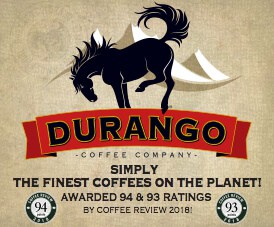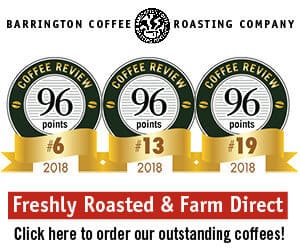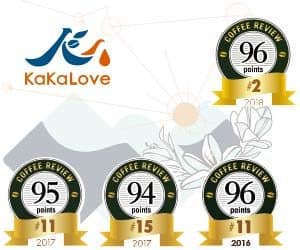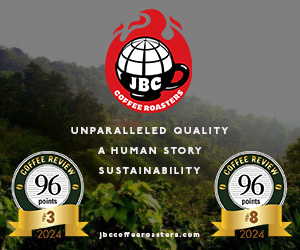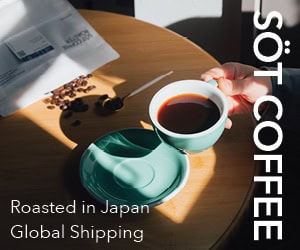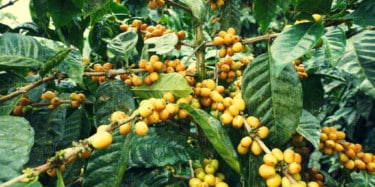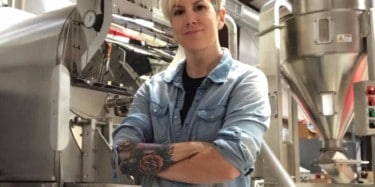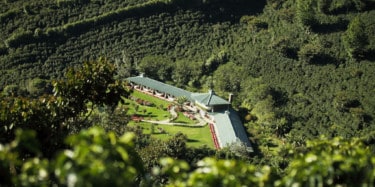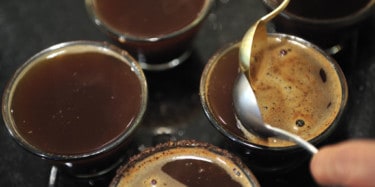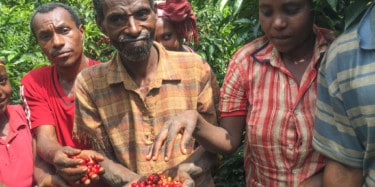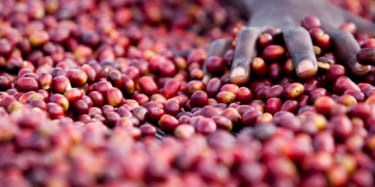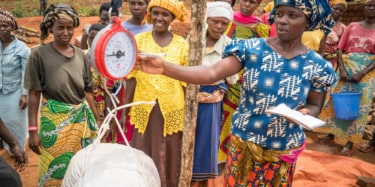Produced from trees of the admired SL-28 and SL-34 varieties of Arabica. Despite grower discontent and urban encroachment on prime coffee lands, Kenya continues to produce some of the world’s most elegant and distinctive coffees. This sample consists entirely of peaberries, a kind of bean that results when the coffee fruit develops only a single, oval bean rather than the usual pair of flat-sided
SEARCH RESULTS
Nano Challa
Produced by the Nano Challa cooperative in Ethiopia’s Jimma Zone. Southern and western Ethiopia coffees like this one are produced largely from local, indigenous varieties of Arabica. When processed by the wet or washed method (fruit skin and pulp are removed before drying) they typically express great aromatic complexity and intensity, with a particular emphasis on citrus, cocoa and floral notes.
“Big-Bean” Coffee Varieties: Novelty, Scarcity, and Atypical Sensory Pleasures
Among the hundreds of coffees we review each year at Coffee Review, a very small percentage represent what we've come to affectionately call "big-bean" varieties, coffee from tree varieties that produce beans that are dramatically larger than average. The most common of these are Pacamara, Maragogipe and Maracaturra, though there are some even more obscure varieties whose beans are also
La Providencia Guatemala Maragogype
This exceptional coffee was selected as the No. 8 coffee on Coffee Review’s list of the Top 30 Coffees of 2018. This coffee earned the second-highest highest rating in a cupping of coffees from big-bean varieties for Coffee Review’s November 2018 tasting report. Produced by Max Ariel Palacios Villatoro of La Providencia, entirely from trees of the Maragogipe variety of Arabica. The Maragogipe
Red Bourbon Honey Cold Brew Coffee
This exceptional coffee was selected as the No. 17 coffee on Coffee Review’s list of the Top 30 Coffees of 2018. Sold in attractive 8.4-ounce cans. Sourced and roasted by Bird Rock Coffee and extracted by a proprietary version of room-temperature brewing trademarked Rain by the BKON company.Contains no ingredients other than coffee and water. The green coffee used to produce this beverage is a
Suyusama Program Colombia
Produced by some of the 900 small-holding farmers participating in the Suyusama Program, a project focused on coffee quality and environmental and socio-economic sustainability. From trees of the Colombia, Castillo and Caturra varieties. Processed by the wet or “washed” method, in which skin and fruit flesh are removed from the beans or seeds before they are dried. Bird Rock Coffee Roasters is a
Finca La Maria Geisha Natural
This sample earned the highest rating in a cupping of coffees roasted by women for Coffee Review‘s April 2018 tasting report. Produced by Orlando Espina of Finca La Maria entirely from trees of the rare Ethiopia-derived botanical variety Gesha (also spelled Geisha), this coffee won second place in the 2017 Colombia Cup of Excellence. With its elegantly elongated beans and distinctive floral and
Women in Coffee: Why It Matters That “She’s the Roaster”
Last summer, we began our exploration of women's roles in the complex coffee supply chain by looking at the work of farmers—women who work in coffee production as pickers, managers, members of cooperatives, and owners of small farms. In this month's report, we turn our attention to those women who are crucial in the next step of the supply chain: turning green coffee into roasted. We structured
Love Letters
A blend of coffees from El Salvador and Indonesia. This coffee tied for the third-highest rating in a cupping of blends for Coffee Review‘s February 2018 tasting report. Based in the San Diego area, Bird Rock Coffee Roasters is a retailer and wholesaler focused on organic and socially responsible coffees; it was awarded the “2012 Micro-Roaster of the Year” title by Roast Magazine. Visit
Blending Coffees: Craft, Intuition and Thematic Riffs
Blending any two or more things together is a curious and complex act. In winemaking, grapes are often blended to combine extremes in character while simultaneously softening each. Foods may be blended for contrast: Lemon and butter combined, for example, make a classic sauce for pasta or fish that is both richly creamy and tart, a flavor profile that a single food can’t provide. Coffee is an
Panama Auromar Estate Geisha Peaberry
Regrettably, this fine coffee sold out before the publication of our review. Produced from trees of the rare Ethiopia-derived botanical variety Gesha (also Geisha) by farmer Roberto Brenes of Auromar Estate. With its generally elongated beans and distinctive floral and crisp, often chocolaty cup, the Gesha variety continues to distinguish itself as one of the world’s most unique coffees. This is a
El Salvador Finca Kilimanjaro
This exceptional coffee was selected as the No. 16 coffee on Coffee Review’s list of the Top 30 Coffees of 2017, and it tied for the second-highest rating in a tasting of holiday coffees for Coffee Review‘s December 2017 tasting report. Finca Kilimanjaro is an El Salvador farm named after East Africa’s highest peak by Aida Batlle, one of El Salvador’s (and Central America’s) most respected and
2017 Holiday Gift Coffees
Each year, we ask roasters to send us exceptional coffees available only during the holidays, coffees that might make particularly gratifying gifts or splurges for coffee-lovers. In past years, approaches have ranged from particularly fine lots of classic coffees that roasters reserved for the holiday season, to rare and often expensive seasonally available micro-lot coffees, to ingenious and
Top Coffees by Category – 2017
In the past, our Top 30 Coffees lists tended to favor high-scoring coffees produced from botanical varieties of Arabica with striking sensory properties such as Geshas, coffees from the distinctive traditional Ethiopian varieties, Kenyan coffees, and so on. In 2015, we began the practice of recognizing coffees by category to focus attention on fine coffees from other parts of the world and/or
Organic-Certified Coffees from Africa: Benefits, Challenges, Complexities
Certified organic coffees must be propagated, grown, processed, transported, stored, and roasted without contact with synthetic chemicals—particularly without contact with pesticides and herbicides. The certification process (carried out by a variety of organizations operating inside a common framework) is lengthy, thorough, rather expensive, but apparently reliable and free of abuse. The use of
Guatemala Finca El Injerto Gesha
El Injerto is one of Guatemala’s most celebrated coffee farms. This Gesha is planted from seed brought from Hacienda La Esmeralda, the Panama farm where Gesha was first rediscovered and presented to the coffee world in 2004. With its generally elongated beans and distinctive floral and crisp, often chocolaty cup, the Gesha variety continues to distinguish itself as one of the world’s most unique
Panama Duncan Estate Wine-Processed
Produced by Richard Koyner of Duncan Estate exclusively from trees of the Caturra variety of Arabica. This is a dried-in-the-fruit or “natural” coffee, but one that was allowed to partly dry on the trees before picking and final drying, a practice which helps impart a mildly fermenty or wine-like character to the fruit notes. Based in the San Diego area, Bird Rock Coffee Roasters is a retailer and
Gesha Coffees 2017: Still Pricey, Still Amazing
I was at one of the Specialty Coffee Association’s Re:co Symposia a couple of years ago, where Jay Ruskey of Goodlands Organic, the pioneer of California coffee-growing, was displaying fresh branches of two varieties of coffee trees at his table outside the meeting rooms. Some of the branches were from the respected mainstream Caturra coffee variety, which is producing some very nice coffees on
El Salvador Finca Kilimanjaro Natural
Finca Kilimanjaro is an El Salvador farm named after East Africa’s highest peak by Aida Batlle, one of El Salvador’s (and Central America’s) most respected and innovative coffee producers. Finca Kilimanjaro is planted with the famous SL28 variety of Arabica, the variety that produces the finest coffees of Kenya. This is a dry-processed or “natural” coffee, meaning the beans were dried inside the
Holding Up (More Than) Half The Sky: Coffees From Women Producers
Mao Zedong’s famous statement that “women hold up half the sky” became central to the zeitgeist of the Western feminist movement of the 1960s and ‘70s, when identity politics began to foreground the plight of women—economically, socially and politically—both in the U.S. and abroad. Regardless of one’s position on the merits of focusing on gender-based affiliations versus shared values as tools for


